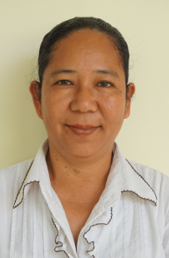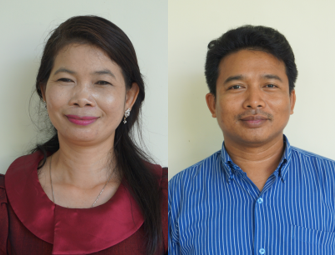
Team experience in providing capacity development on effective classroom management with a focus on differentiation in teaching and learning to the target groups
We are a group of national trainers on effective classroom management, assigned by the Ministry of Education, Youth and Sport to support the new Teacher Education Colleges (TEC) of Phnom Penh and Battambang.
Our task force, as we call it, has experience in:
- Developing and preparing materials and relevant documents before providing training
Topics in the training manual:- Differentiation
- Flexible grouping
- Positive discipline
- Time management
- Space management
- Highly interactive facilitation skills during the sessions
- Managing time and space effectively and efficiently
- Good collaboration by caring and being responsible to lead the training efficiently
- Being flexible based on the real situation
- Methods of providing constructive feedbacks
 Mrs. Som Dany: "I observed that participants of our training, all teacher trainers, were interested in new ways of checking attendance by using clothespins and hangers. Each teacher trainer's names was written on a clothespin and the pin had a colour to indicate their subject matter, for example yellow for mathematics and blue for science. The colours made it easy to form the groups I wanted to from during the training. Before leaving the room at the end of the day, everyone put their own clothespin on a empty hanger. When they entered the classroom the next training day, they took their clothespin and put it on the hanger marked 'arrived'. I could check quickly how many participants had arrived and how many hadn't. Another advantage of this technique is that it helped us to know the participants better by calling them by their names from the clothespins. Knowing your participants or students' names is important for differentiated instructions."
Mrs. Som Dany: "I observed that participants of our training, all teacher trainers, were interested in new ways of checking attendance by using clothespins and hangers. Each teacher trainer's names was written on a clothespin and the pin had a colour to indicate their subject matter, for example yellow for mathematics and blue for science. The colours made it easy to form the groups I wanted to from during the training. Before leaving the room at the end of the day, everyone put their own clothespin on a empty hanger. When they entered the classroom the next training day, they took their clothespin and put it on the hanger marked 'arrived'. I could check quickly how many participants had arrived and how many hadn't. Another advantage of this technique is that it helped us to know the participants better by calling them by their names from the clothespins. Knowing your participants or students' names is important for differentiated instructions."
Confidence and responsibility
Having offered training on classroom management to about 140 teacher trainers of the two TECs, we feel that we have been working hard, with confidence and responsibility. It is also an opportunity for us to learn from each other in terms of knowledge, experience and to build a good relationship as a team.
Mrs. Hun Makara, Mr. Danh Sophy and Mr. Kuy Chanmongkol:
"We think that training on differentiation helps to change routines and attitudes of teachers and students, to make sure that all students, both the slower and faster ones, are reached. The differentiation strategies, for example 'extended instruction' provide necessary support to learners who struggle with the lesson content. The learners are collectively grouped and taught using more concrete materials and receive continuous guidance and instruction from the teacher. It is important that those students receive additional teacher support for the topics they struggle with and are not simply labelled as slow learners."


First results
Participants in the training mentioned they are pleased to be involved in each activity and they share their knowledge from the training with their student teachers, such as:
- Methods of differentiation by using pictures, animals, worksheet, working speed, resources, academic achievement, preferences, evaluation, conversations and support.
- Techniques on how to get to know your students well: dialogue at the door, it is about your bag, Journal book, dialogue book, survey, satisfaction assessment and etc
- Screening attendance with the wooden stick
- Variety of ways to form groups and how to manage it effectively
- Integrating differentiated instructions in STEM activities by producing water rocket
Ms. Sin Sochenda:

"What interested me and the participants the most was the session on STEM activities in which the participants developed a water rocket. Every rocket team was happy to make te rocket and try it out before its final launching to win the competition. We not only focused on each component of STEM but also incorporated differentiated instruction into the activity:
- The lower-ability group received the building materials, a picture of the end product and extended instruction from the trainer.
- The medium-ability group received the building materials and a picture of the end product.
- The high-ability group received only the building materials."

National Task Force on Effective Classroom Management
Mr. Danh Sophy - Department of Curriculum Development
Mr. Hang Piseth - Primary Education Department
Mrs. Hun Makara - Teacher Trainer Siem Reap
Mrs. Kem Sosethea - Teacher Trainer Kampong Cham
Mr. Kuy Chanmongkul - Primary Education Department
Mrs. Lay Chinda - Teacher Trainer Kampong Cham
Mr. Men Vannary - Teacher Training Department
Mr. Sam Sokchea - Teacher Trainer Battambang
Ms. Sin Sochenda - Teacher Trainer Kampong Chhnang
Mrs. Som Dany - Teacher Trainer Kandal
Mr. Srey Sambun - Teacher Trainer Battambang





